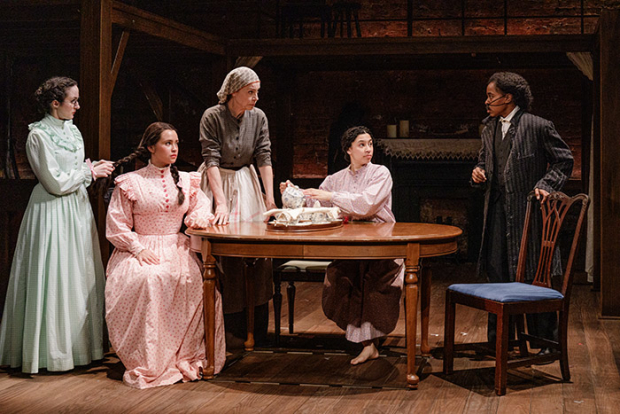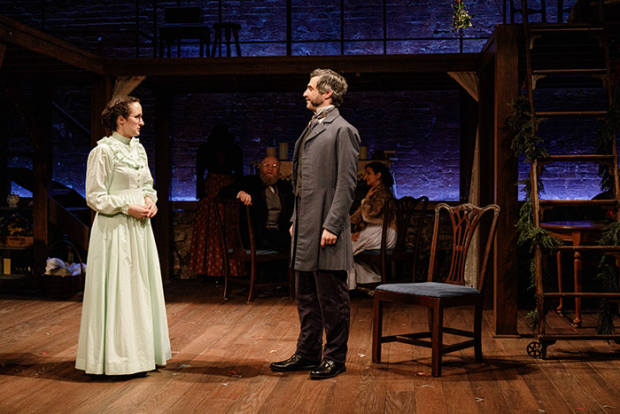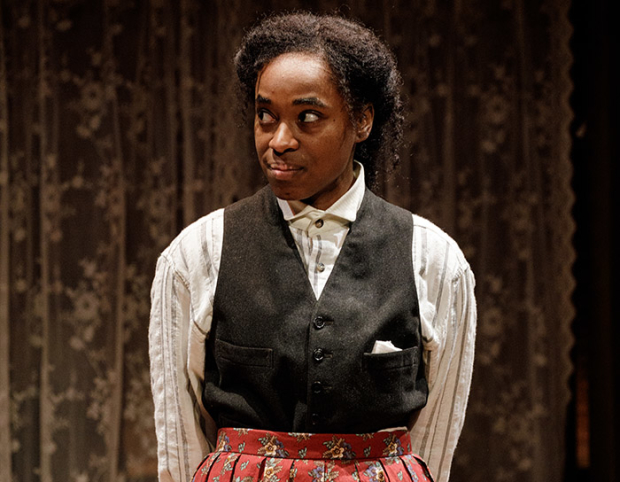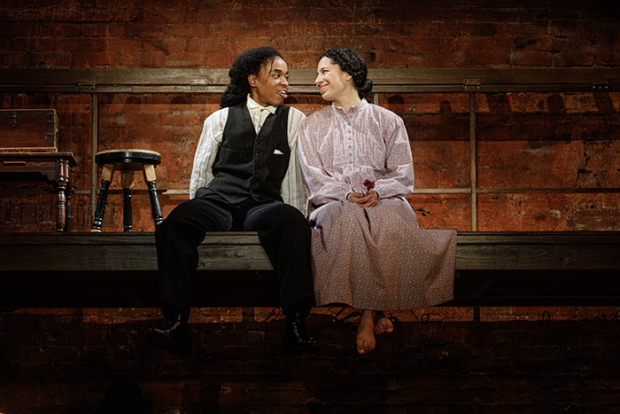This Little Women Is Not About to Make Jo Give Up Her Career for a Man
Playwright Kate Hamill sits down with her director and star to talk about revising Louisa May Alcott’s classic novel for the stage.
With a spirit of great love, respect, and admiration, Kate Hamill continues her streak of calling "bullsh*t" on classic works (or at least how they're dramatized) with Louisa May Alcott's Little Women, now running at Primary Stages' Cherry Lane Theatre.
It's all part of her mission to "reclaim" the classics in a way that reflects the experiences of the people they're now speaking to. What that means for Little Women in a practical sense is a cast of diverse March sisters ("I think it's so bullsh*t when the classics are lily-white, because they're supposed to be universal stories", says Hamill); less equivocation about Jo's sexuality and gender identity questions ("It's revisionist history to think that these were not issues that had come up with people over and over again," she adds, speaking to the play's LGBTQ themes); and the complete deletion of Jo's marriage to Professor Bhaer, which, when it was first written, was Alcott's concession to her literary audience ("Professor Bhaer is dead," the playwright joked).
Hamill (who also plays Meg, the most traditional of the March sisters) joined her director, Sarna Lapine, and the production's Jo, Kristolyn Lloyd, for a roundtable conversation about the 19th-century masterpiece and its depiction of how women are shackled in carved-out pockets of American life. Those pockets may have shifted slightly over the past 150 years, but as long as they exist, Little Women — in all its unassuming glory — will have plenty to say.

(© James Leynse)
This interview has been edited and condensed for clarity.
Kate, you say in your program note that when you adapt classics, you ask yourself, "Why this story, why now?" So why this story, and why now?
Kate Hamill: I was interested in creating a Little Women that spoke to American women today about how gender roles flatten out people's lives and how people struggle with fitting in gender roles. I was really interested in creating a central character in a classic story that LGBTQ teens and young people could see and go, "Oh, people like me have always existed." I also wanted to create a story in which Jo does not give up her writing career and choose to marry a man, which is what happens in the book. It would be such a betrayal for Jo to just give up her ambitions for a heteronormative love right now.
Sarna Lapine: From a young age, I felt the burden of having to choose between career and a romantic or domestic life. It always felt like one or the other, which absolutely was true for Jo March and Louisa May Alcott (in their time, becoming a wife and mother was the only job). So I think it's an incredibly ahead-of-its-time narrative about what it means as an individual to seek your value outside of domestic spheres.

(© James Leynse)
Do you all feel a kindred spirit with any particular sister? Kate, you gave yourself the role of Meg, so does that answer my question?
Kate: I guess I do feel like I am a Meg in some ways. When I was growing up I weirdly felt more like an Amy — which is very exposing to say. [laughs] But now I feel like I'm sort of a Meg in that I identify with someone who wants to do well and be a perfectionist and is frustrated by my own failings, which Meg definitely is.
Kristolyn Lloyd: I identify with Jo. I grew up in a predominantly white community where I was the only little girl with the kind of hair that I have, and the kind of skin color. Little girls played princesses and witches, and I was always the witch. I never got to play the princess. So I know what it means to see people accomplishing this gender identity and you feel as though you're falling short and never given a chance to fully nurture and explore who you are.
But I didn't grow up in a household where we read Little Women. My parents were very pro-Afrocentric, so we grew up reading The Autobiography of Malcolm X and having conversations about Jackie Robinson and the civil rights movement, which actually has a lot to do with my relationship to classical pieces. Women who stand out like that — like in Little Women. So when I read Kate's version of Little Women, there was something about Jo that was incredibly unnerving and vulnerable for me to explore. So my relationship with Jo didn't really start until I had fully read Kate's play. Then I read the book and it was an immediate love affair.

(© James Leynse)
Sarna: I didn't grow up identifying much with Little Women. I would have probably thought of myself more like a Laurie. I grew up with older brothers and a lot of male cousins and I was incredibly resentful of my gender from a very young age. I never felt as though I was born into the wrong physical body, but I felt very uncomfortable with the expectations that came with my gender.
What I identify with more than anything is, I'm a reader. I believe in the power of language to transform the world, and that is the power of a narrative like Little Women in the time that it was written. The country was physically tearing itself apart — and here we are again tearing ourselves apart, or rather, being torn apart by our elected president. But what happens in all of that destruction is this incredible moment of rebirth. Sometimes you have to burn it to the ground to rebuild the things you love the most.
And while the world is burning, Beth is the one quietly keeping the family together. Beth is typically the forgotten sister of Little Women, but this production takes time to pause on her. Why?
Kate: I think it's so easy to be reductive about any of these characters and I just think, again, that speaks to society's judgment on them. There's this beautiful line from the book that is not in the play, which says something like, The world is full of Beths, and you don't realize how much they contributed until they're gone.
Kristolyn: At the end of the show, I say about Beth, "It wasn't a great epic, but that's why it needs to be told." Because we forget that we are the protagonists of our own stories. And they need to be told.
Kate: I remember my mother was like, "You're playing Meg? She's so boring!" That's why I wanted to play her — because the world is full of people who give up their dreams because they've been sold a bill of goods. These women live huge lives on a deceptively small scale, and Jo tries to immortalize these "Little Women" on a big scale.
Sarna: Beth becomes an example of what it is to be a moral center in American life. It's very telling how that can be overlooked, because it isn't Hamlet, it isn't somebody who is in a conflict of ego, it isn't somebody who's doing something seemingly heroic. It is somebody who, with all her limitations, is doing the only thing she can do, and that is holding everybody to their truth and accepting them for who they are.
Jo, meanwhile, is trying to embody a masculine hero, dress up as the masculine villain, and be violent and sexy and bad. There are other stories to be discovered, which is what Beth keeps pushing for. I think sometimes the way we might misunderstand or mistreat Beth is a great reflection of our own internalized misogyny.

(© James Leynse)







